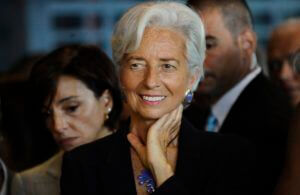
IMF chief Christine Lagarde has given an unexpected positive appraisal of cryptocurrencies. This comes only a few weeks after she called for more regulation. In a blog post, Lagarde points out at the various advantages of using distributed ledger technology in various sectors including banking and healthcare.
Crypto-assets can have “a significant impact on how we save, invest and pay our bills,” she wrote. She, however, warns people to be more judicious about how they look at the industry.

Likewise lawmakers “should keep an open mind and work toward an even-handed regulatory framework that minimizes risks while allowing the creative process to bear fruit.”
Last month she raised concern about the potential use of cryptocurrencies in money laundering and financing terrorism. Her comments then served to worsen a market that has been in bear territory for much of this year. The comments formed part of a sustained onslaught by government officials and heads of financial institutions on the industry.
No Immediate Threat to Financial Stability
Lagarde does not see cryptocurrencies posing any immediate threat to financial stability. She however urges regulators to closely monitor its development.
“Crypto-assets have the potential to magnify the risks of highly leveraged trading, and to increase the transmission of economic shocks should they become more integrated into mainstream financial products.”
Crypto-assets enable fast and inexpensive financial transactions while offering some of the convenience of cash. Some payment services now make overseas transfers in a matter of hours, not days, she notes. Privately issued crypto-assets are, however, “risky and unstable.”
“There may be a demand for central banks to provide digital forms of money,” she wrote. The idea is the subject in the forthcoming Global Financial Stability Report.
Threat to Banks
Banks might, however, experience shocks in their business models should cryptocurrencies be widely adopted, she warns.
“Regulators might find it harder to ensure the stability of a more diffuse and decentralized financial system. Central banks might have more trouble acting as the lender of last resort in case of a crisis.”

Before this, cryptocurrencies, however, need to earn the confidence of consumers and authorities. Lagarde calls for consensus among regulators on what role cryptocurrencies should play.
The assessment is similar to the one made by Mark Carney, Governor, Bank of England. Carney who also chairs the Financial Stability Board (SFB) noted that cryptocurrencies only accounted for 1% of global GDP. In his letter to the G20 summit, Carney had also called for regulation of the sector to prevent money laundering and terrorism financing.
Efficient Financial Markets
Distributed ledger technology could help financial markets run more efficiently while the smart contract functionality can eliminate some intermediaries.
The Australian Securities is already testing the use of blockchain to manage clearing and settlement of transactions.
Markets Gain
Markets gained slightly on Tuesday although it is not clear whether this is linked to the remarks by the IMF chief.
Bitcoin remains above $8000 hours after making some losses. Overall, it has gained a marginal 1.37% in the last 24 hours.

Other cryptocurrencies are in the green with Bitcoin Diamond and Bytecoin being one of the biggest gainers at 10% and 11% respectively. Dentacoin made the biggest jump among the top 100 at 57%.
EOS continues with its momentum gaining 9.88% in the last 24 hours according to data from CoinMarketCap. The coin is now ranked sixth by market capitalisation.
Litecoin gained 8.21% while Ethereum, Ripple and Bitcoin Cash went up by 1.81%, 3.51% and 3.56% respectively.
The market has been seeing a renewed surge in the last week. It is still unclear what propelled it but many have speculated about the entry of a large institutional investor.
At one point, Bitcoin made gains unprecedented gains of more than $1000 in less than an hour breaching both the $7000 and $8000 levels. It has since been facing resistance.

